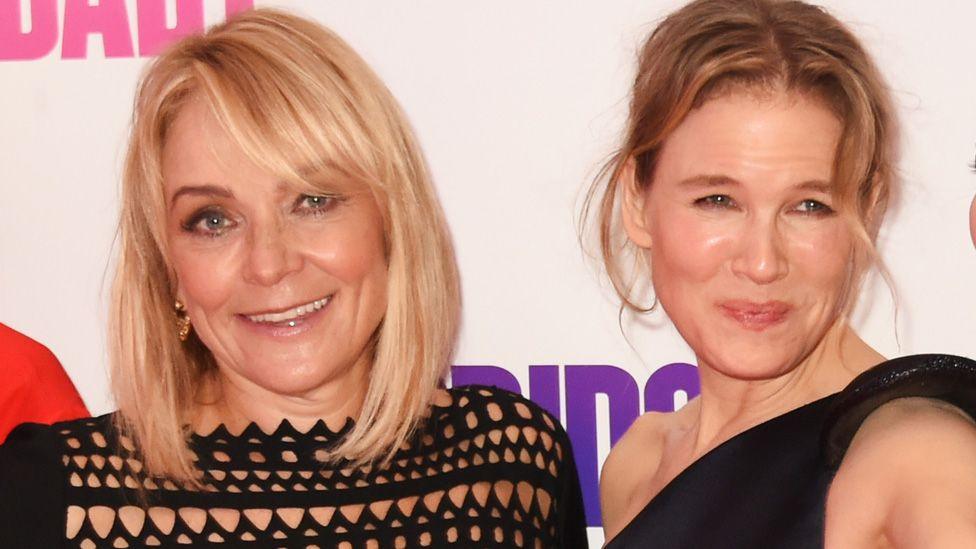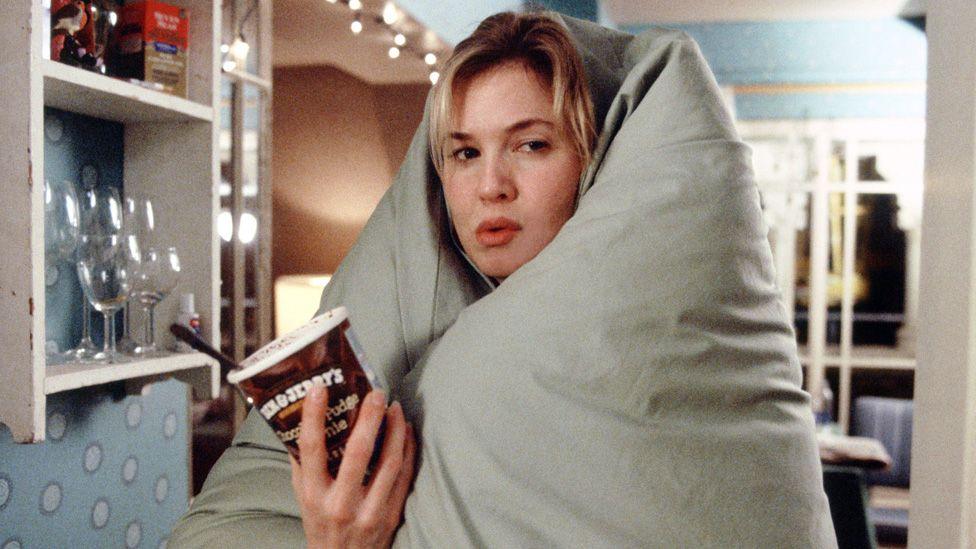Bridget Jones back in fashion with Gen Z, author says

Helen Fielding (left) with Renee Zellweger, who plays Bridget Jones on screen
- Published
Author Helen Fielding says Bridget Jones has found a new audience with Gen Z, who have more problems than young women did 30 years ago but take comfort in the character's trials and tribulations.
"What's good now is that there's a new audience for Bridget that's young, that's Gen Z," Fielding said at the Cheltenham Literature Festival.
"I'm really happy when 18-year-olds and 20-year-olds come with their books and talk to me about it and say that they find it comforting to laugh at these things."
Bridget Jones went straight to many women's hearts in the 1990s, but some think the floundering and flawed heroine, who's fixated with her weight and relationship status, is not the best role model.
Bridget Jones's Diary became a best-seller in 1996 and the character has featured in three more books and three film adaptations, with a fourth film due to be released early next year.
Fielding, 66, said she sees similarities between Bridget and some friends of her 18-year-old daughter.
"I spent the last two years surrounded by teenage girls, because they all came to my house, and I can see what they've got in common with Bridget," she said, speaking to BBC Radio 4's Martha Kearney at the event.
"They're the first generation who have gone through seeing the world fall apart [with the pandemic]. So they're quite fragile, and they're quite open about their emotions. They sort of cry in the bathroom and put it on TikTok.
'A million times worse today'
"And they're very sort of cosy, and they're very supportive of their friends, and they're quite funny, and they like to wear bunny ears, and they like to wear slippers and pyjamas and have all these little rituals and ways of taking care of themselves and loving their friends.
"With Bridget, it was about the gap between how you feel you're expected to be and how you actually are - this idea that whatever you're like, it's not quite good enough and there's something you've got to fix.
"And for them, it's a million times worse because they go on TikTok and they're looking at people who are filtered, and they're looking at all these impossible things that they're supposed to be, and they're still worrying about their bodies.
"This is anecdotal. I'm not a sociologist," she added. "But they're still worrying about their weight and what they look like - is it right, is it wrong, should they have a Brazilian butt lift or what?
"But at the same time, there's an another layer of feeling guilty because of the body positivity movement. So they also feel a failure for even thinking about whether they're the right shape. So it's complicated for that generation."

Zellweger will return to the role for Bridget Jones: Mad About The Boy next year
Bridget Jones has remained popular - the first two novels featured in a recent chart of the 100 books that have spent the most weeks on the Sunday Times best-seller list over the past 50 years.
Bridget Jones's Diary has sold just over 2,000 copies in the UK so far this year - up 22% compared with the same period in 2023, according to Nielsen BookData.
But some people have never been amused by Bridget's obsession with her size and men, some of whom are responsible for casual workplace sexual harassment.
"Bridget deserved better. We all did," wrote Elisabeth Egan in the New York Times, external last year.
"Today’s young women know that neurotic isn’t cute. Cute isn’t cute. Neither is flustered, madcap, zany, flighty, flaky, harried or hapless - all adjectives that apply to Bridget."
New Bridget Jones film very sad, says Hugh Grant
- Published5 October 2024
Fourth Bridget Jones film to hit screens in 2025
- Published10 April 2024
Fielding admitted some parts of the story have not aged well.
"Bridget Jones's Diary couldn't be written now, set now, because all those men in the office would be sacked," she said. "It was a really different time."
That harassment is "all still there" in real life, however, she added. "It's just under the parapet. It's not gone away."
Bridget's calorie counting came directly from the diaries Fielding wrote at university, she said.
"There was not much in them in the way of social engagements, but every day there was my weight and a list of food with calories next to it - like yogurt 150 calories, carrot 15 calories, box of milk tray 4,000 calories.
"Don't get cross about the character, look at the response to the character. I wasn't writing that to try and say, everyone be like me and make these lists. I just wrote it and then there was this response of people who identified with it.
"So that's the question - why did people identify with someone feeling like that? And why are the Gen Zs still identifying with that sense that your body's all wrong, and then still coping on top of that with the fact that they shouldn't be thinking about it in the first place?"
She added: "Why do people identify with it, is the question. It's not that she's influencing people, it's that people are responding to that emotional truth in the first book."